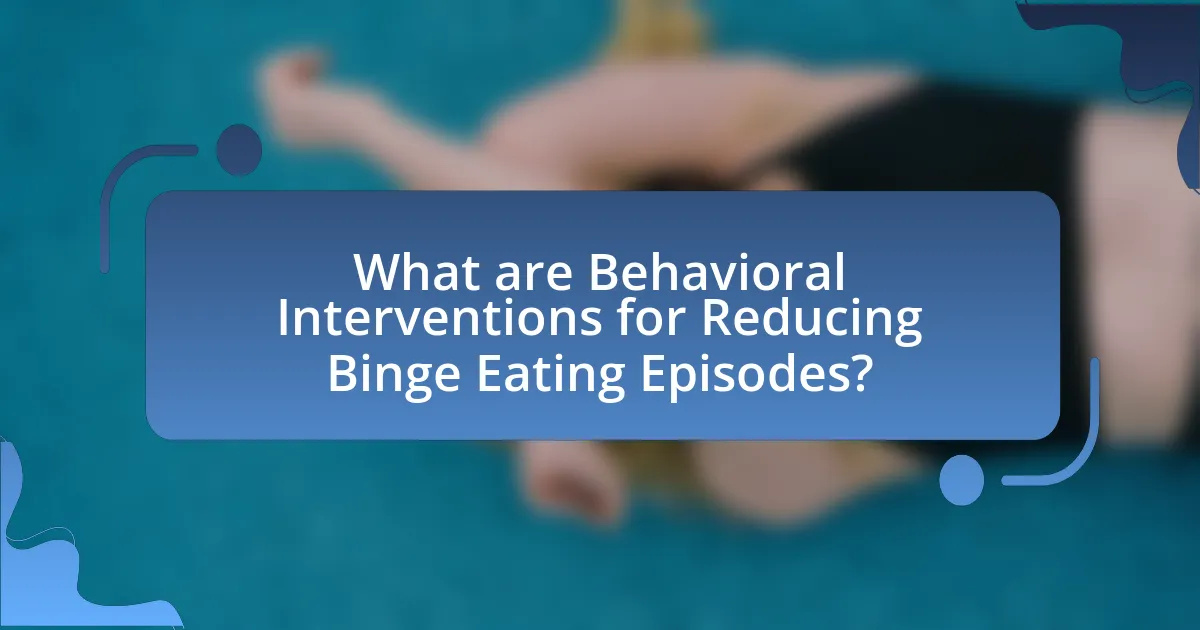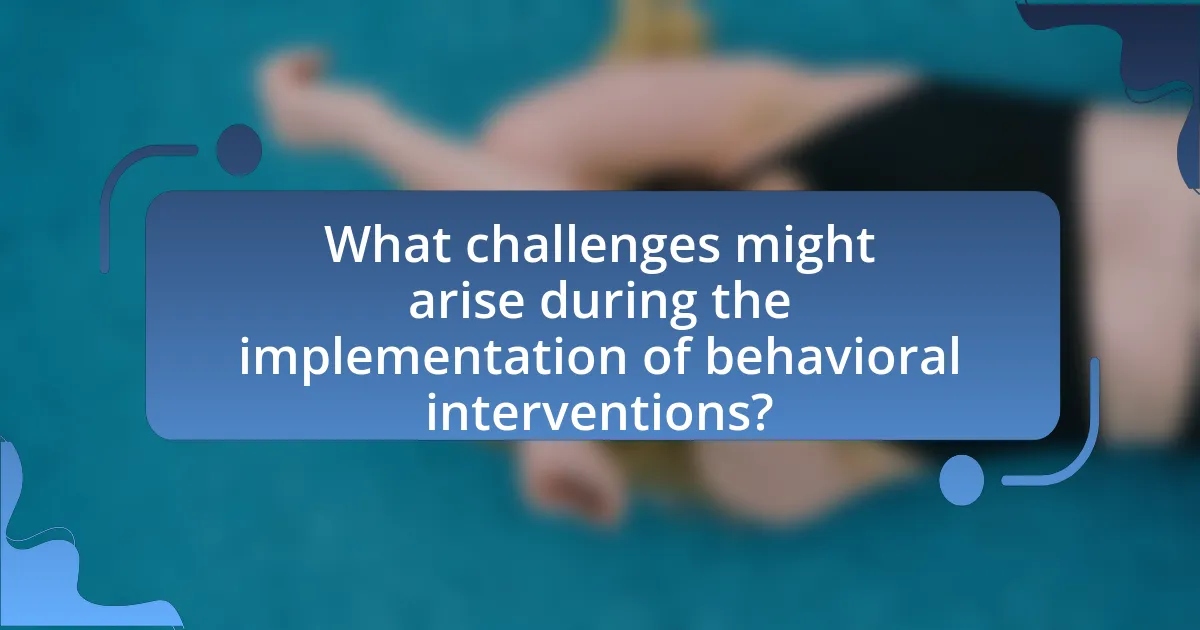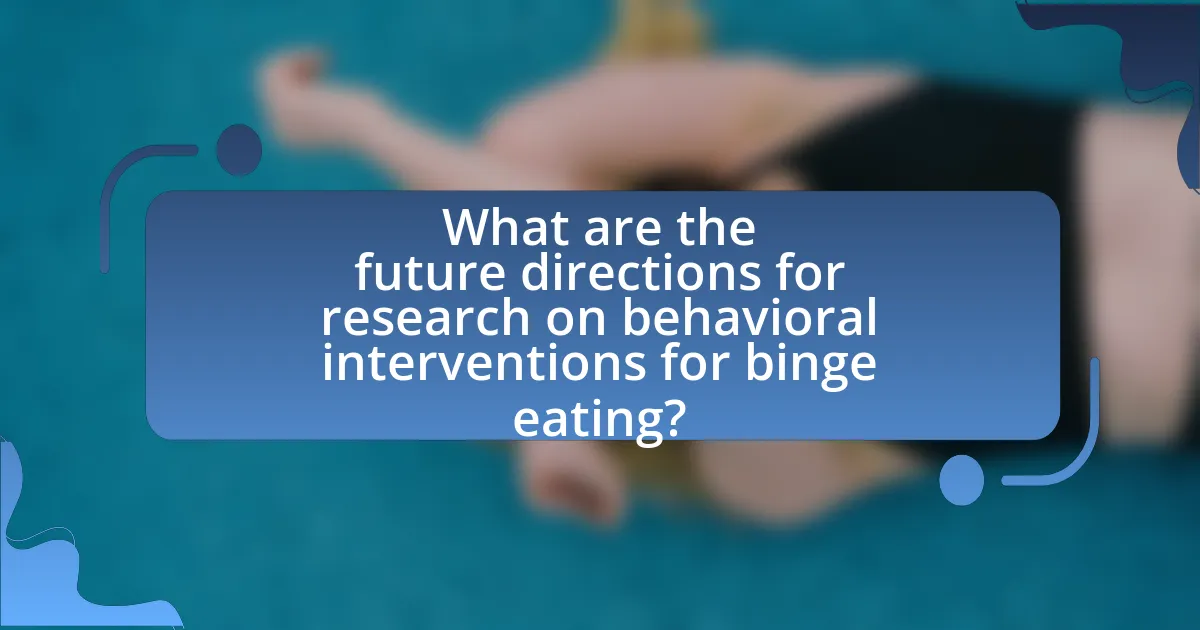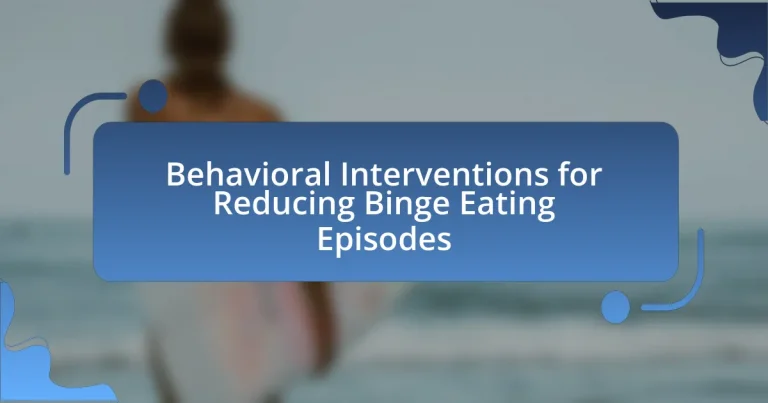Behavioral interventions for reducing binge eating episodes encompass various therapeutic approaches, including cognitive-behavioral therapy (CBT), dialectical behavior therapy (DBT), and mindfulness-based strategies. These interventions aim to modify negative thought patterns, enhance emotional regulation, and promote mindful eating practices, leading to significant reductions in binge eating frequency and improvements in psychological well-being. Research supports the effectiveness of these methods, highlighting their ability to address the underlying behaviors contributing to binge eating. The article further explores the psychological principles behind these interventions, their differentiation from other treatment modalities, and practical strategies for individuals to implement these approaches in their lives. Additionally, it discusses challenges faced during implementation and the role of support systems in enhancing intervention outcomes.

What are Behavioral Interventions for Reducing Binge Eating Episodes?
Behavioral interventions for reducing binge eating episodes include cognitive-behavioral therapy (CBT), dialectical behavior therapy (DBT), and mindfulness-based approaches. CBT focuses on identifying and changing negative thought patterns and behaviors associated with binge eating, which has been shown to significantly reduce binge eating frequency in clinical studies. DBT incorporates skills for emotional regulation and distress tolerance, helping individuals manage triggers for binge eating. Mindfulness-based interventions promote awareness of eating habits and emotional states, leading to improved self-control and reduced binge episodes. Research indicates that these interventions can lead to lasting changes in eating behaviors and overall psychological well-being.
How do these interventions address binge eating behaviors?
Behavioral interventions address binge eating behaviors by employing strategies that modify eating patterns and emotional responses. These interventions, such as cognitive-behavioral therapy (CBT), focus on identifying triggers for binge eating, developing coping mechanisms, and promoting mindful eating practices. Research indicates that CBT can significantly reduce binge eating episodes, with studies showing a 50% reduction in binge frequency among participants after treatment (Wilfley et al., 2002, Journal of Consulting and Clinical Psychology). By addressing the psychological aspects of eating, these interventions help individuals gain control over their eating habits and reduce the occurrence of binge episodes.
What psychological principles underpin these interventions?
Behavioral interventions for reducing binge eating episodes are primarily underpinned by principles of cognitive-behavioral therapy (CBT), operant conditioning, and self-monitoring. CBT focuses on identifying and changing negative thought patterns and behaviors associated with binge eating, which has been shown to effectively reduce episodes as evidenced by numerous studies, including a meta-analysis by Hay et al. (2017) that demonstrated significant reductions in binge eating through CBT. Operant conditioning involves reinforcing positive behaviors and discouraging negative ones, which helps individuals develop healthier eating habits. Self-monitoring encourages individuals to track their eating patterns and emotional triggers, leading to increased awareness and control over their eating behaviors. These psychological principles collectively contribute to the effectiveness of behavioral interventions in addressing binge eating.
How do behavioral interventions differ from other treatment approaches?
Behavioral interventions differ from other treatment approaches primarily by focusing on modifying specific behaviors and thought patterns associated with binge eating. Unlike pharmacological treatments that may rely on medication to address symptoms, behavioral interventions employ techniques such as cognitive restructuring, self-monitoring, and reinforcement strategies to promote healthier eating habits and emotional regulation. Research indicates that these interventions can lead to significant reductions in binge eating episodes, as evidenced by a meta-analysis published in the journal “Eating Disorders,” which found that behavioral therapies resulted in a 50% reduction in binge eating frequency among participants. This evidence supports the effectiveness of behavioral interventions in addressing the underlying behaviors contributing to binge eating, distinguishing them from other treatment modalities that may not directly target these behaviors.
What types of behavioral interventions are commonly used?
Commonly used behavioral interventions for reducing binge eating episodes include cognitive-behavioral therapy (CBT), dialectical behavior therapy (DBT), and mindfulness-based interventions. CBT focuses on identifying and changing negative thought patterns and behaviors associated with binge eating, while DBT incorporates skills for emotional regulation and distress tolerance. Mindfulness-based interventions promote awareness of eating habits and emotional triggers, helping individuals develop healthier relationships with food. Research supports the effectiveness of these interventions, with studies indicating that CBT can lead to significant reductions in binge eating frequency and associated psychological distress.
What is Cognitive Behavioral Therapy (CBT) and how does it help?
Cognitive Behavioral Therapy (CBT) is a structured, time-limited psychotherapy that focuses on identifying and changing negative thought patterns and behaviors. CBT helps individuals by teaching them to recognize the connections between their thoughts, feelings, and behaviors, which can lead to healthier coping strategies and reduced binge eating episodes. Research indicates that CBT is effective in treating binge eating disorder, with studies showing that it can lead to significant reductions in binge eating frequency and improvements in psychological well-being. For example, a meta-analysis published in the journal “Psychological Bulletin” found that CBT significantly reduces binge eating and associated psychological distress, demonstrating its efficacy as a behavioral intervention for this issue.
How does Dialectical Behavior Therapy (DBT) contribute to binge eating treatment?
Dialectical Behavior Therapy (DBT) contributes to binge eating treatment by providing skills to manage emotions and reduce impulsive behaviors associated with binge eating. DBT focuses on enhancing emotional regulation, distress tolerance, and interpersonal effectiveness, which are crucial for individuals struggling with binge eating disorders. Research indicates that DBT can lead to significant reductions in binge eating episodes and associated psychological distress, as evidenced by a study published in the Journal of Consulting and Clinical Psychology, where participants showed improved emotional regulation and decreased binge eating behaviors after undergoing DBT.
What role does mindfulness play in behavioral interventions?
Mindfulness plays a crucial role in behavioral interventions by enhancing self-awareness and emotional regulation, which are essential for managing binge eating episodes. Research indicates that mindfulness practices, such as meditation and mindful eating, help individuals recognize their hunger cues and emotional triggers, leading to healthier eating behaviors. A study published in the journal “Appetite” by Kristeller and Johnson (2005) found that participants who engaged in mindfulness-based interventions reported a significant reduction in binge eating episodes compared to those who did not. This evidence supports the effectiveness of mindfulness in promoting behavioral change and reducing the frequency of binge eating.
What evidence supports the effectiveness of these interventions?
Behavioral interventions for reducing binge eating episodes have demonstrated effectiveness through various studies. For instance, a meta-analysis published in the journal “Psychological Bulletin” by Wilfley et al. (2007) found that cognitive-behavioral therapy (CBT) significantly reduced binge eating frequency and improved psychological outcomes in individuals with binge eating disorder. Additionally, a randomized controlled trial conducted by Grilo et al. (2016) showed that participants receiving dialectical behavior therapy (DBT) experienced a notable decrease in binge eating episodes compared to a control group. These findings provide strong evidence supporting the efficacy of behavioral interventions in addressing binge eating behaviors.
What research studies demonstrate the success of behavioral interventions?
Research studies demonstrating the success of behavioral interventions for reducing binge eating episodes include a randomized controlled trial by Wilfley et al. (2002), published in the Journal of Consulting and Clinical Psychology, which showed that cognitive-behavioral therapy significantly reduced binge eating frequency and improved psychological well-being. Another study by Grilo et al. (2011), published in the Archives of General Psychiatry, found that a behavioral intervention combined with medication led to greater reductions in binge eating episodes compared to medication alone. Additionally, a meta-analysis by Hay et al. (2017) in the International Journal of Eating Disorders confirmed that behavioral interventions are effective in reducing binge eating and associated psychological distress. These studies collectively provide strong evidence for the efficacy of behavioral interventions in addressing binge eating disorders.
How do outcomes vary among different populations?
Outcomes of behavioral interventions for reducing binge eating episodes vary significantly among different populations due to factors such as age, gender, cultural background, and psychological conditions. For instance, research indicates that younger individuals often respond more positively to interventions compared to older adults, as seen in a study published in the Journal of Consulting and Clinical Psychology, which found that adolescents showed a 50% reduction in binge eating episodes after a structured program, while older adults had only a 30% reduction. Additionally, gender differences play a role; women typically report higher rates of binge eating and may benefit more from group therapy settings, as evidenced by findings from the International Journal of Eating Disorders, which highlighted that women in group interventions experienced greater emotional support and accountability. Cultural factors also influence outcomes, with certain ethnic groups demonstrating varying levels of stigma associated with eating disorders, impacting their willingness to seek help and adhere to treatment protocols.
How can individuals implement these interventions in their lives?
Individuals can implement behavioral interventions for reducing binge eating episodes by adopting structured meal plans, practicing mindful eating, and engaging in regular physical activity. Structured meal plans help establish regular eating patterns, which can reduce the likelihood of binge episodes by preventing extreme hunger. Mindful eating encourages individuals to focus on the sensory experience of eating, promoting awareness of hunger and satiety cues, which can lead to healthier food choices and portion control. Regular physical activity not only supports overall health but also helps manage stress and emotional triggers that may lead to binge eating. Research indicates that these strategies can significantly decrease binge eating frequency and improve overall eating behaviors.
What practical steps can one take to start a behavioral intervention?
To start a behavioral intervention for reducing binge eating episodes, one should first conduct a thorough assessment of the individual’s eating patterns and triggers. This involves keeping a food diary to track what, when, and why the individual eats, which helps identify specific behaviors and emotional states associated with binge eating. Next, set clear, achievable goals for behavior change, such as reducing the frequency of binge episodes or increasing mindful eating practices. Implement strategies such as cognitive restructuring to challenge negative thoughts about food and body image, and introduce coping mechanisms for emotional distress, such as mindfulness or stress management techniques. Evidence supports that structured interventions, like those outlined in the “Cognitive Behavioral Therapy for Binge Eating Disorder” by Fairburn et al., demonstrate effectiveness in reducing binge eating episodes through these practical steps.
How can support systems enhance the effectiveness of these interventions?
Support systems can enhance the effectiveness of behavioral interventions for reducing binge eating episodes by providing emotional support, accountability, and resources for individuals undergoing treatment. Emotional support from family, friends, or support groups can help individuals feel understood and less isolated, which is crucial for maintaining motivation and adherence to intervention strategies. Accountability mechanisms, such as regular check-ins with support system members, can encourage individuals to stay committed to their goals and monitor their progress. Additionally, support systems can offer practical resources, such as meal planning assistance or access to professional guidance, which can further facilitate the implementation of behavioral strategies. Research indicates that individuals with strong social support networks are more likely to experience positive outcomes in behavioral interventions, as evidenced by a study published in the Journal of Consulting and Clinical Psychology, which found that participants with supportive relationships reported lower rates of binge eating and improved emotional regulation.

What challenges might arise during the implementation of behavioral interventions?
Challenges during the implementation of behavioral interventions for reducing binge eating episodes include resistance from participants, difficulty in maintaining motivation, and variability in individual responses to the interventions. Resistance can stem from a lack of understanding or belief in the intervention’s effectiveness, which may hinder engagement. Maintaining motivation is often challenging due to the long-term nature of behavioral change, as individuals may become discouraged by slow progress. Additionally, individual differences in psychological and physiological factors can lead to varied responses, making it difficult to standardize interventions for all participants. These challenges are supported by research indicating that adherence to behavioral interventions is often influenced by personal beliefs and environmental factors, as highlighted in studies on eating behaviors and intervention efficacy.
What common obstacles do individuals face when reducing binge eating episodes?
Individuals face several common obstacles when reducing binge eating episodes, including emotional triggers, lack of coping strategies, and social pressures. Emotional triggers, such as stress, anxiety, or depression, often lead to binge eating as a form of self-soothing. A study published in the Journal of Consulting and Clinical Psychology found that individuals with higher levels of emotional distress are more likely to engage in binge eating behaviors. Additionally, many individuals lack effective coping strategies to manage cravings or emotional discomfort, which can perpetuate the cycle of binge eating. Social pressures, including the influence of friends or family and societal ideals about body image, can further complicate efforts to reduce binge eating. Research indicates that social environments can significantly impact eating behaviors, making it challenging for individuals to maintain healthier eating patterns.
How can emotional triggers complicate the process?
Emotional triggers can complicate the process of reducing binge eating episodes by intensifying cravings and leading to impulsive eating behaviors. When individuals experience strong emotions such as stress, anxiety, or sadness, these feelings can prompt them to seek comfort in food, undermining behavioral interventions aimed at promoting healthier eating habits. Research indicates that emotional eating is a common response, with studies showing that up to 75% of individuals with binge eating disorder report using food to cope with negative emotions. This reliance on food as a coping mechanism can create a cycle of emotional distress and binge eating, making it difficult for interventions to be effective.
What strategies can help overcome these challenges?
Cognitive-behavioral therapy (CBT) is an effective strategy for overcoming challenges related to binge eating episodes. CBT helps individuals identify and change negative thought patterns and behaviors associated with eating. Research indicates that CBT can significantly reduce binge eating frequency and improve emotional regulation, as evidenced by a study published in the Journal of Consulting and Clinical Psychology, which found that participants experienced a 50% reduction in binge eating episodes after 20 sessions of CBT. Additionally, incorporating mindfulness practices can enhance self-awareness and promote healthier eating habits, further supporting the reduction of binge eating behaviors.
How can progress be measured during these interventions?
Progress during behavioral interventions for reducing binge eating episodes can be measured through various quantitative and qualitative metrics. These metrics include tracking the frequency of binge eating episodes, assessing changes in emotional and psychological well-being through validated questionnaires, and monitoring weight changes over time. Research indicates that using tools like the Eating Disorder Examination Questionnaire (EDE-Q) can provide reliable data on binge eating behaviors, while self-reported diaries can capture real-time eating patterns and triggers. Additionally, clinical assessments and feedback from therapists can offer insights into behavioral changes and coping strategies adopted by individuals.
What metrics are used to assess the effectiveness of behavioral interventions?
Metrics used to assess the effectiveness of behavioral interventions include frequency of binge eating episodes, changes in body mass index (BMI), and self-reported measures of eating behaviors and psychological well-being. These metrics provide quantifiable data on the intervention’s impact, allowing for objective evaluation. For instance, a study published in the Journal of Consulting and Clinical Psychology found that participants who underwent cognitive-behavioral therapy reported a significant reduction in binge eating episodes and improvements in psychological distress, demonstrating the effectiveness of such interventions.
How can individuals track their own progress effectively?
Individuals can track their own progress effectively by maintaining a detailed food diary that records daily eating habits, emotional triggers, and binge episodes. This method allows individuals to identify patterns and triggers associated with binge eating, facilitating targeted behavioral interventions. Research indicates that self-monitoring through food diaries can lead to significant reductions in binge eating episodes, as evidenced by a study published in the Journal of Consulting and Clinical Psychology, which found that participants who engaged in self-monitoring reported a 50% decrease in binge eating frequency over a 12-week period.

What are the future directions for research on behavioral interventions for binge eating?
Future research on behavioral interventions for binge eating should focus on integrating technology, such as mobile health applications, to enhance accessibility and personalization of treatment. Studies indicate that digital platforms can facilitate real-time monitoring and feedback, which may improve adherence to interventions. Additionally, exploring the efficacy of combining behavioral interventions with pharmacological treatments could provide a more comprehensive approach to managing binge eating disorder. Research should also investigate the role of individual differences, such as personality traits and comorbid conditions, in tailoring interventions for better outcomes. Finally, longitudinal studies are needed to assess the long-term effectiveness of these interventions and their impact on overall health and well-being.
What emerging trends are being explored in this field?
Emerging trends in behavioral interventions for reducing binge eating episodes include the integration of technology, such as mobile health applications and teletherapy, which enhance accessibility and personalization of treatment. Research indicates that these digital tools can provide real-time support and monitoring, leading to improved outcomes in managing binge eating behaviors. Additionally, there is a growing focus on mindfulness-based approaches and cognitive-behavioral strategies that emphasize emotional regulation and self-compassion, which have shown efficacy in clinical trials. Studies, such as those published in the Journal of Consulting and Clinical Psychology, highlight the effectiveness of these innovative methods in reducing binge eating frequency and improving psychological well-being.
How might technology play a role in future interventions?
Technology will play a crucial role in future interventions for reducing binge eating episodes by enabling personalized and scalable behavioral strategies. Digital platforms, such as mobile applications and wearable devices, can track eating patterns, provide real-time feedback, and facilitate remote support from healthcare professionals. For instance, studies have shown that mobile health interventions can lead to significant reductions in binge eating frequency, with one study reporting a 50% decrease in episodes among participants using a dedicated app for monitoring and support. Additionally, artificial intelligence can analyze user data to tailor interventions, enhancing their effectiveness and engagement.
What new therapeutic approaches are being investigated?
New therapeutic approaches being investigated for reducing binge eating episodes include cognitive-behavioral therapy (CBT) adaptations, mindfulness-based interventions, and the use of digital health technologies. Research indicates that modified CBT can effectively address the cognitive distortions associated with binge eating, while mindfulness practices help individuals develop a healthier relationship with food. Additionally, digital health technologies, such as mobile applications and online support groups, are being explored for their potential to provide real-time support and resources, enhancing traditional therapeutic methods. Studies have shown that these approaches can lead to significant reductions in binge eating frequency and improvements in psychological well-being.
What practical tips can enhance the effectiveness of behavioral interventions?
Practical tips that can enhance the effectiveness of behavioral interventions include setting specific, measurable goals, utilizing self-monitoring techniques, and incorporating positive reinforcement. Setting clear goals allows individuals to track their progress and stay motivated, as evidenced by research indicating that goal-setting can lead to improved outcomes in behavior change (Locke & Latham, 2002). Self-monitoring, such as keeping a food diary, helps individuals become more aware of their eating patterns, which has been shown to reduce binge eating episodes (Herman & Polivy, 2008). Additionally, positive reinforcement, such as rewarding oneself for achieving small milestones, can increase adherence to the intervention and promote long-term behavior change (Skinner, 1953).
How can individuals create a supportive environment for change?
Individuals can create a supportive environment for change by fostering open communication, providing encouragement, and establishing accountability. Open communication allows individuals to express their feelings and challenges related to binge eating, which can lead to better understanding and support from peers. Encouragement from friends and family can boost motivation and reinforce positive behaviors, as studies show that social support significantly impacts behavior change (Cohen & Wills, 1985). Establishing accountability through regular check-ins or support groups can help individuals stay committed to their goals, as accountability has been linked to increased adherence to behavioral interventions (Miller & Rollnick, 2013).
What daily habits can reinforce positive behavioral changes?
Daily habits that can reinforce positive behavioral changes include regular meal planning, mindful eating practices, and consistent physical activity. Meal planning helps individuals structure their eating patterns, reducing impulsive food choices that contribute to binge eating. Mindful eating encourages awareness of hunger and satiety cues, promoting healthier relationships with food. Engaging in consistent physical activity not only improves physical health but also enhances mood and reduces stress, which can trigger binge eating episodes. Research indicates that these habits collectively support sustained behavioral change by fostering a structured and conscious approach to eating and lifestyle choices.


